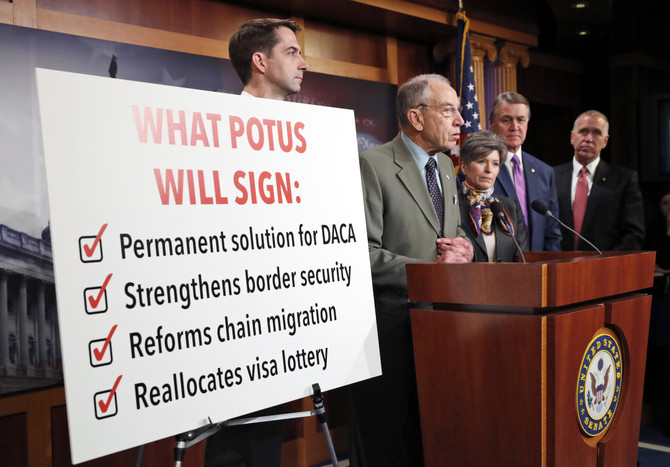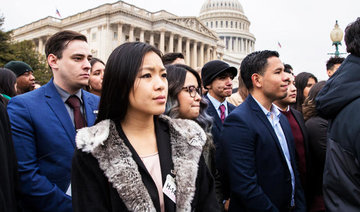WASHINGTON: A group of senators reached a bipartisan agreement aimed at balancing Democrats’ fight to offer citizenship to young “Dreamer” immigrants with President Donald Trump’s demands for billions to build his coveted border wall with Mexico.
Though the compromise was announced Wednesday by 16 senators with centrist views on the issue and was winning support from many Democrats, it faced an uncertain fate. Leaders were trying to schedule votes on that plan and three other immigration proposals for Thursday, which they hoped would bring the chamber’s showdown over the hot-button issue to a close.
While not specifically mentioning the bipartisan pact, Trump urged lawmakers to oppose any plan that doesn’t meet his more stringent demands, which include curbs on legal immigration and the abolition of a visa lottery. The Senate’s No. 2 Republican, John Cornyn of Texas, warned that lawmakers need to address Trump’s entire proposal, saying, “We need to take the president seriously.”
There were also qualms among Democrats. The party’s No. 2 Senate leader, Dick Durbin of Illinois, said some Democrats had “serious issues” with parts of the plan. Those concerns focused on its spending for Trump’s wall and its bar against Dreamers sponsoring their parents for legal residency.
“We’re not there yet,” Durbin said of the 60 votes the proposal would need for approval.
So far, no other proposals from either side seem able to do that. Republicans control the chamber 51-49, though Sen. John McCain, R-Arizona, has missed the last several weeks while battling cancer.
The bipartisan measure’s sponsors included eight GOP senators. That meant just three more Republicans would be needed for it to prevail if it is backed by all 47 Democrats and the two independents who usually support them.
The compromise emerged as senators spent a third day of debate largely as they spent the first two — with the chamber floor mostly empty. Other than an initial roll call allowing formal debate to begin, there have been no other votes while party leaders talk behind the scenes about scheduling votes on specific proposals.
The centrist proposal was produced by a group led by Sens. Susan Collins, R-Maine, and Joe Manchin, D-W.Virginia, that spent weeks seeking middle ground.
It would grant a 10- to 12-year route to citizenship for 1.8 million Dreamers, participants said.
That’s the same number Trump has suggested helping with his own wider-ranging but more restrictive proposal. Dreamers are young immigrants who were brought to the US illegally as children and still have no permanent protection from deportation.
The plan would provide $25 billion over a decade, $2.5 billion annually, for a wall and other border security measures, the same total Trump has requested. It would bar Dreamers from sponsoring their parents for citizenship, far narrower than Trump’s proposal to prevent all legal immigrants from bringing parents and siblings to the US
The moderates’ measure does not alter a lottery that distributes about 55,000 visas annually to people from diverse countries. Trump has proposed ending it and redistributing its visas to other immigrants, including some who are admitted based on job skills, not family ties.
“The diversity lottery is kind of toxic politically because of some of the things said by the president,” said Sen. Lindsey Graham, R-S.C., a reference to a vulgar description Trump used for African countries during a discussion of immigration.
The White House issued a written statement by Trump urging senators to back his bill and “oppose any legislation that fails to fulfill” his demands. But the statement did not say Trump would veto a bill that fell short of them.
A GOP measure tracking Trump’s proposal and backed by McConnell has been introduced and was expected to receive a vote. Few expect it to attract 60 votes, but Sen. Mike Rounds, R-S.D., said he believed the bipartisan proposal could.
If that happens, Rounds said, “We’ll allow the president to determine whether or not it moves in the direction that he wants.”
Senate Minority Leader Chuck Schumer, D-N.Y., indirectly embraced the bipartisan plan, saying, “Each side has had to give a great deal, but we are closer than we have ever been to passing something in the Senate to help the Dreamers.”
Also in play is a more modest plan by McCain and Sen. Chris Coons, D-Delaware It would let many Dreamers qualify for permanent residency and direct federal agencies to more effectively control the border by 2020. But it doesn’t offer a special citizenship pathway for Dreamers, raise border security funds or make sweeping changes in legal immigration rules.
The White House said it opposes the McCain-Coons plan, saying it would “increase illegal immigration” and cause other problems.
Another vote will be taken on a proposal by Sen. Pat Toomey, R-Pennsylvania, that would add language blocking federal grants to “sanctuary cities,” communities that don’t cooperate with federal efforts to enforce immigration laws. The amendment is considered sure to lose.
Bipartisan US immigration pact among several senate proposals
Bipartisan US immigration pact among several senate proposals

Argentina to try 10 in absentia over 1994 bombing of Jewish center

- Argentina and Israel have long suspected Lebanon’s Shiite Hezbollah group of carrying it out at Iran’s request
- Judge Daniel Rafecas acknowledged the “exceptional” nature of the decision to send the case to court, over three decades after the bombing and with the suspects all still at large
BUENOS AIRES: Argentina will try in absentia ten Iranian and Lebanese nationals suspected of the 1994 bombing of a Jewish community center in Buenos Aires, which killed 85 people, a ruling seen by AFP on Thursday said.
The attack, which caused devastation in Latin America’s biggest Jewish community, has never been claimed or solved, but Argentina and Israel have long suspected Lebanon’s Shiite Hezbollah group of carrying it out at Iran’s request.
Judge Daniel Rafecas acknowledged the “exceptional” nature of the decision to send the case to court, over three decades after the bombing and with the suspects all still at large.
Trying them in absentia, he said, allowed to “at least try to uncover the truth and reconstruct what happened.”
On July 18, 1994, a truck laden with explosives was driven into the Argentine Israelite Mutual Association (AMIA) and detonated.
The deadliest attack in Argentina’s history injured more than 300 people
No-one has ever been arrested over the attack.
The ten suspects facing trial are former Iranian and Lebanese ministers and diplomats for whom Argentina has issued international arrest warrants.
Since 2006 Argentina had sought the arrest of eight Iranians, including then-president Ali Akbar Hashemi Bahramaie Rafsanjani, who died in 2017.
Iran has always denied any involvement and refused to arrest and hand over suspects.
Thursday’s ruling on trying them in absentia is the first of its kind in the South American country.
Until March this year, the country’s laws did not allow for suspects to be tried unless they were physically present.
It comes amid a new push in recent years for justice to be served over the attack, backed by President Javier Milei, a staunch ally of Israel.
Rafecas said a trial in absentia was justified given the “material impossibility of securing the presence of the defendants and the nature of the crime against humanity under investigation.”
In April 2024, an Argentine court blamed Hezbollah for the attack, which it called a “crime against humanity.”
It found that the attack and another on the Israeli embassy in 1992 that killed 29 people were likely triggered by the Argentine government under then-president Carlos Menem canceling three contracts with Iran for the supply of nuclear equipment and technology.
The court did not however manage to produce evidence of Iran’s involvement.
The Inter-American Court of Human Rights in San Jose, Costa Rica last year found the Argentine state responsible for not preventing, nor properly investigating, the attack.
It also blamed the state for efforts to “cover up and obstruct the investigation.”
Former president Cristina Kirchner has been ordered to stand trial over a memorandum she signed with Iran in 2013 to investigate the bombing.
The memorandum, which was later annulled, allowed for suspects to be interrogated in Iran rather than Argentina, leading Kirchner to be accused of conspiring with Tehran in a cover-up.
She has denied the allegations.
Germany scraps funding for sea rescues of migrants

- “I don’t think it’s the foreign office’s job to finance this kind of sea rescue,” Wadephul said
- “We need to be active where the need is greatest“
BERLIN: Germany is cutting financial support for charities that rescue migrants at risk of drowning in the Mediterranean, saying it will redirect resources to addressing conditions in source countries that spur people to leave.
For decades, migrants driven by war and poverty have made perilous crossings to reach Europe’s southern borders, with thousands estimated to die every year in their bid to reach a continent grown increasingly hostile to migration.
“Germany is committed to being humane and will help where people suffer but I don’t think it’s the foreign office’s job to finance this kind of sea rescue,” Foreign Minister Johann Wadephul told a news conference.
“We need to be active where the need is greatest,” he added, mentioning the humanitarian emergency in war-shattered Sudan.
Under the previous left-leaning government, Germany began paying around 2 million euros ($2.34 million) annually to non-governmental organizations carrying out rescues of migrant-laden boats in trouble at sea.
For them, it has been a key source of funds: Germany’s Sea-Eye, which said rescue charities have saved 175,000 lives since 2015, received around 10 percent of its total income of around 3.2 million euros from the German government.
Chancellor Friedrich Merz’s conservatives won February’s national election after a campaign promising to curb irregular migration, which some voters in Europe’s largest economy see as being out of control.
Even though the overall numbers have been falling for several years, many Germans blame migration-related fears for the rise of the far-right Alternative for Germany (AfD), now the second largest party in parliament.
Many experts say that migration levels are mainly driven by economic and humanitarian emergencies in the source countries, with the official cold shoulder in destination countries having had little impact in deterring migrants.
Despite this, German officials suggest that sea rescues only incentivise people to risk the sometimes deadly crossings.
“The (government) support made possible extra missions and very concretely saved lives,” said Gorden Isler, Sea-Eye’s chairperson. “We might now have to stay in harbor despite emergencies.”
The opposition Greens, who controlled the foreign office when the subsidies were introduced, criticized the move.
“This will exacerbate the humanitarian crisis and deepen human suffering,” said joint floor leader Britta Hasselmann.
Mass shooting in gang-plagued Mexican state leaves 12 dead and more injured

- The attorney general’s office in Guanajuato said some 20 others were hospitalized
- Mexican President Claudia Sheinbaum said the victims included children
MEXICO CITY: At least 12 people were killed, including a teenager, and more wounded in a Tuesday night shooting in the central Mexican city of Irapuato, authorities said on Wednesday.
The attorney general’s office in Guanajuato, the violence-plagued state where Irapuato is located, said some 20 others were hospitalized with gunshot wounds.
Mexican President Claudia Sheinbaum said earlier on Wednesday that the victims included children, although the attorney general’s office later confirmed only one casualty was a minor, aged 17.
“It is very unfortunate what happened. An investigation is under way,” Sheinbaum said.
Local media reported the shooting happened during an evening party celebrating a Catholic holiday, the Nativity of John the Baptist.
A video circulating on social media showed people dancing in the patio of a housing complex while a band played in the background, before gunfire erupted. Reuters was not immediately able to verify the video.
Guanajuato has been for many years one of the most violent regions in the country.
On Tuesday, five other people were killed in other parts of the state, according to the attorney general’s office.
29 pupils taking high school exams killed in Central Africa crush

- In the ensuing panic, supervisors and students tried to flee, some jumping from the first floor of the school
- “I would like to express my solidarity and compassion to the parents of the deceased candidates, to the educational staff, to the students,” Touadera said
BANGUI: Twenty-nine students taking their high school exams in the Central African Republic died in a stampede sparked by an exploding power transformer, the health ministry told AFP Thursday.
Just over 5,300 students were sitting the second day of the baccalaureate exams at the time of the explosion early Wednesday afternoon in Bangui, the capital of the deeply poor nation.
In the ensuing panic, supervisors and students tried to flee, some jumping from the first floor of the school.
The injured were transported by ambulance, on the back of pickup trucks or by motorbike taxi, AFP journalists saw.
“I would like to express my solidarity and compassion to the parents of the deceased candidates, to the educational staff, to the students,” President Faustin Archange Touadera said in a video published on his party’s Facebook page.
Touadera, who is attending a summit of the Gavi vaccine alliance in Brussels, also announced three days of national mourning.
According to a document circulating on social media and authenticated by the health ministry, 29 deaths were registered by hospitals in the city.
“The hospital was overwhelmed by people to the point of obstructing caregivers and ambulances, a health ministry source stated.
UN peacekeepers, police and other security were seen around the Barthelemy Boganda high school and hospitals.
Education Minister Aurelien-Simplice Kongbelet-Zingas said in a statement Wednesday that “measures will be taken quickly to shed light on the circumstances of this incident.”
The minister added that a further statement would follow regarding selection of a date for the students to resume their exams program.
The Republican Bloc for the Defense of the Constitution (BRDC), a coalition of opposition parties, condemned what it termed “the irresponsibility of the authorities in place, who have failed in their duty to ensure the safety of students and school infrastructure.”
The CAR is among the poorest countries in the world and, since independence from France in 1960, has endured a succession of coups, authoritarian rulers and civil wars.
The latest civil war started more than a decade ago. The government has secured the main cities and violence has subsided in recent years.
But fighting occasionally erupts in remote regions between rebels and the national army, which is backed by Wagner mercenaries and Rwandan troops.
Municipal, legislative, and presidential elections are scheduled for August and December of this year but UN experts are calling for urgent institutional reform of the electoral authority before the polls and for “transparent internal governance,” as tensions between the government and the opposition intensify.
Kremlin says no date yet for next round of Ukraine peace talks

- Peskov said Russia was in favor of continued US efforts to mediate
- They have made no progress toward a ceasefire
MOSCOW: The Kremlin said on Thursday there was no progress yet toward setting a date for the next round of peace talks with Ukraine, Interfax news agency reported.
Another agency, TASS, quoted Kremlin spokesman Dmitry Peskov as saying Russia was in favor of continued US efforts to mediate.
Resuming negotiations after a gap of more than three years, Russia and Ukraine held face-to-face talks in Istanbul on May 16 and June 2 that led to a series of prisoner exchanges and the return of the bodies of dead soldiers.
But they have made no progress toward a ceasefire which Ukraine, with Western backing, has been pressing for.






















